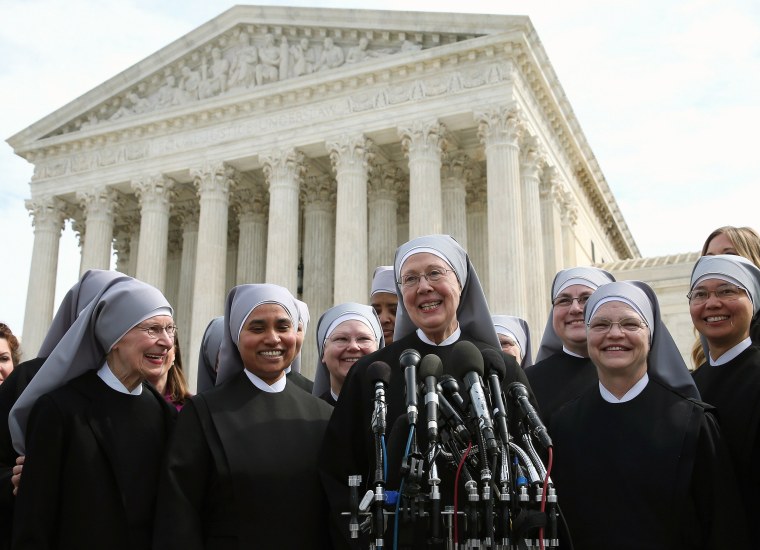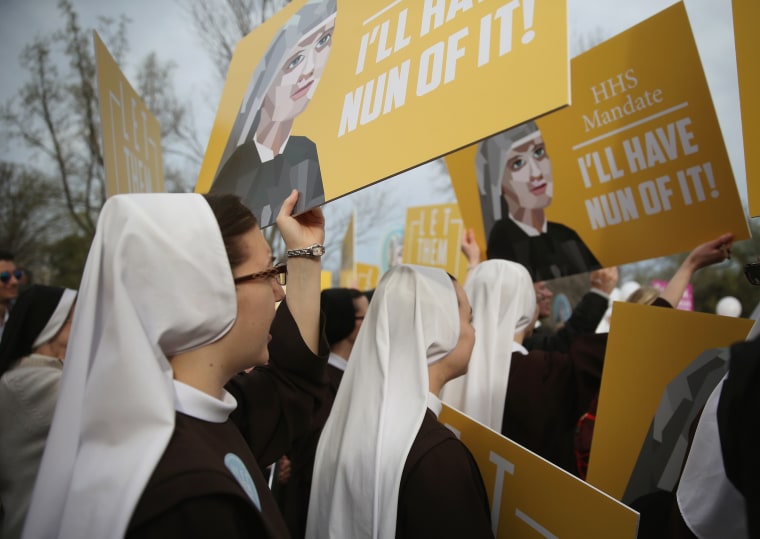Days after progressives were celebrating Supreme Court victories on LGBTQ equality and abortion access, the justices made clear just how they will go about limiting — if not outright dismantling — any judicial wins like these that the left ekes out.
On Wednesday, the court ruled that the Trump administration could exempt employers from offering health insurance coverage for contraception if they have either religious or moral objections to contraception. The 7-2 decision in the case, Little Sisters of the Poor v. Pennsylvania, is a harbinger of things to come.
It’s poised to decide a case next term in which it will likely expand religious objectors’ ability to opt out of civil rights protections.
Little Sisters involved a challenge to a regulation of the Affordable Care Act that required employers to offer coverage for contraception. It exempted churches, which might have objections of conscience, and gave religious objectors not affiliated with churches a path out of the requirement as well: They could notify the federal government or their insurer of their objection to covering the cost of contraception, and the insurer would offer the contraception at no expense to the employee without ever involving the employer. The federal government would reimburse the insurance companies’ expenses.
In 2017, however, the Trump administration decided to exempt all employers from even this notification requirement. The upshot is that, if an employer has religious or moral objections, employees have no way of obtaining free contraception through their employer-sponsored health care insurance.
Wednesday’s decision affirms the Trump administration objections, leaving the up to 126,000 female employees at companies whose owners object to contraception in the lurch. Moreover, in light of the decision, even when laws and courts guarantee rights like abortion and freedom from discrimination, there is a way for entities to get around them.
The concurrence by Justices Samuel Alito and Neil Gorsuch in Wednesday’s ruling provides an even clearer roadmap for how the court will whittle away the recent victories for LGBTQ rights and abortion. Whereas the majority concluded the Trump administration could exempt entities from the contraception mandate, these two justices would have concluded that the administration was required to exempt entities from the mandate under their reading of the Religious Freedom Restoration Act.
Their views and the majority’s views have sweeping implications for the Supreme Court’s recent decisions that appear to be progressive victories.
In one, Bostock v. Clayton County, the court ruled last month that existing anti-discrimination law prevents employers from firing employees because of their sexual orientation or gender identity. But the opinion, written by Gorsuch, made clear that the court was not deciding whether the statutory prohibition against discrimination could be applied to employers who had religious objections to LGBTQ equality. Indeed, the opinion went so far as to describe the Religious Freedom Restoration Act as a statute that could override civil rights legislation.
Unfortunately, the court could soon have an opportunity to put this reasoning into practice, as it’s poised to decide a case next term in which it will likely expand religious objectors’ ability to opt out of civil rights protections.
Specifically, in Fulton v. City of Philadelphia, the court is poised to decide whether Philadelphia can condition eligibility for one-year government contracts on an entity’s compliance with nondiscrimination provisions. A foster care agency is arguing that it shouldn’t be kept from consideration even though it doesn’t offer placements to same-sex couples.
If the foster care agency wins, the decision would expand Wednesday’s ruling to mean that religious objectors are entitled to government funding even if they do not comply with generally applicable conditions for those benefits, rather than merely being exempt from government penalties if they do not comply with government requirements.

There is every reason to think that the court will proceed down that road, since another decision Wednesday, Our Lady of Guadalupe v. Morrissey-Berru, held that nondiscrimination statutes could not be applied to religious teachers at religious schools.
In the hands of this court, it is not clear where religious exemptions will end and women’s health will begin.


